|
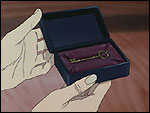
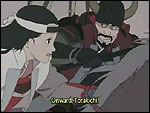
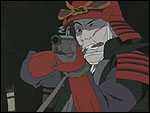
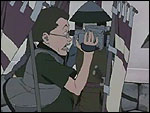

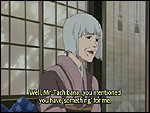
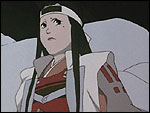
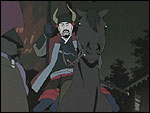

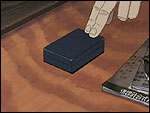

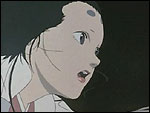
|
by Melissa "Ming-Ling" Louie
In August, Dreamworks SKG announced the creation of a new film distribution arm, Go Fish Pictures, to handle specialty films with limited releases. Its inaugural release, which premiered in September, was Satoshi Kon's (Perfect Blue, Tokyo Godfathers) animated movie, Millennium Actress. Unlike the releases of such anime films as the Pokemon franchise or Spirited Away, the release of Millennium Actress was like the releases of many art-house films. It played in selected cities in a few art-house theaters, in the original Japanese with English subtitles. The movie played in Los Angeles, San Francisco, New York, Chicago, Cambridge and Toronto, and managed to make about $18,000 the first weekend, as well as an additional $14,000 during the week and subsequent weekend. For those unable to catch the film in theaters, a DVD release was slated for the next month, in October. The theater release was to stimulate word-of-mouth in order to boost DVD sales.
Millennium Actress tells the story of Chiyoko Fujiwara, a talented and popular actress who worked on films through a wide range of Japanese history. However, she had not been heard from for many years, and it took the tearing down of the studio she used to work for to stimulate Genya Tachibana, a documentarian and great fan of Chiyoko's works, to track her down and create a film about her life. He brings with him a strange item, a key, which unlocks Chiyoko's memories. As the celebrated actress (now in her 70s) starts to tell her story, we learn that as a school girl, she had a chance encounter with an artist, a rebel and dissenter of the current government. She saves him by misleading the police who are chasing after him and by hiding him in the storeroom. Chiyoko notices the man is wearing a key around his neck, which the man describes as being, "The key to the most important thing there is." The next day, when Chiyoko returns from school, finds the key lying in the snow and runs home, only to see a large crowd in front of the storeroom. Upon learning the artist has fled to the station, she dashes to the train, but catches only a glimpse of him before the train pulls away from the station. Ever after, Chiyoko has been fueled by the desire to meet the artist again.
Chiyoko's story is told through her films, and as we watch her grow and mature, we also watch Japan grow from a feudal state to the changes in the Meiji Restoration, through the World Wars and beyond. Her narrative is so gripping that Genya and his assistant, Kyoji Ida, are drawn into the world Chiyoko weaves - literally. Throughout the flashbacks, the two filmmakers are present as if watching her life from the sidelines, documenting everything as it happens. The result is a blending of fiction and reality, where the lines between her roles and herself cease to be important. Accompanying Chiyoko are a constant set of actors and actresses who always seem to have the same role - whether a motherly figure or her rescuer, these people offer a bit of constancy in an otherwise changing world.
Although the plot is very simple, and some viewers may become bored at the repetition of Chiyoko's chases, the visuals are quite elaborate and detailed. During flashbacks, colors are muted and pale except for Genya and Kyoji, establishing them as outsiders in the scene. Transitions between scenes are sometimes fluid, sometimes abrupt, and keep the viewers on their toes, and even become the point of a joke when Kyoji complains that Genya, who arrives at a scene dressed as a samurai, is stuck in the wrong time period. There is a lot of attention paid to how Chiyoko's movies are shown, echoing the different periods of Japanese filmmaking along with different periods of Japanese history.
Unlike Perfect Blue, Millennium Actress is a simple romance story with warmth and heart that should appeal to a wide audience, and is definitely worth a try when it is released on DVD and VHS, even for those who are not major fans of Japanese animation.
Unfortunately, the DVD will not contain an English dubbed track, because none was produced. Although this fits in with Go Fish's art-house style release, it seems rather a shame. Although this film should definitely be watched in Japanese as it deals with the history of both Japan and Japanese filmmaking, the lack of a dub may make it less appealing to a wider audience. With the visuals pushing forward much of the film's story it also seems a loss to be distracted by subtitles that draw the eye away from the rest of the screen.
Go Fish has also acquired the rights for Ghost in the Shell: Innocence, the new movie from Production IG, directed by Mamoru Oshii. It slated to be released in both Japan and America in the spring of 2004. It will be interesting to see how Go Fish handles this release now that it has Millennium Actress under its belt. Whether Innocence will remain in the art houses with subtitles or is released to a larger number of theaters with a dub is still up in the air. No doubt the success of Millennium Actress will have an influence on future Go Fish films and how they are released.

|

